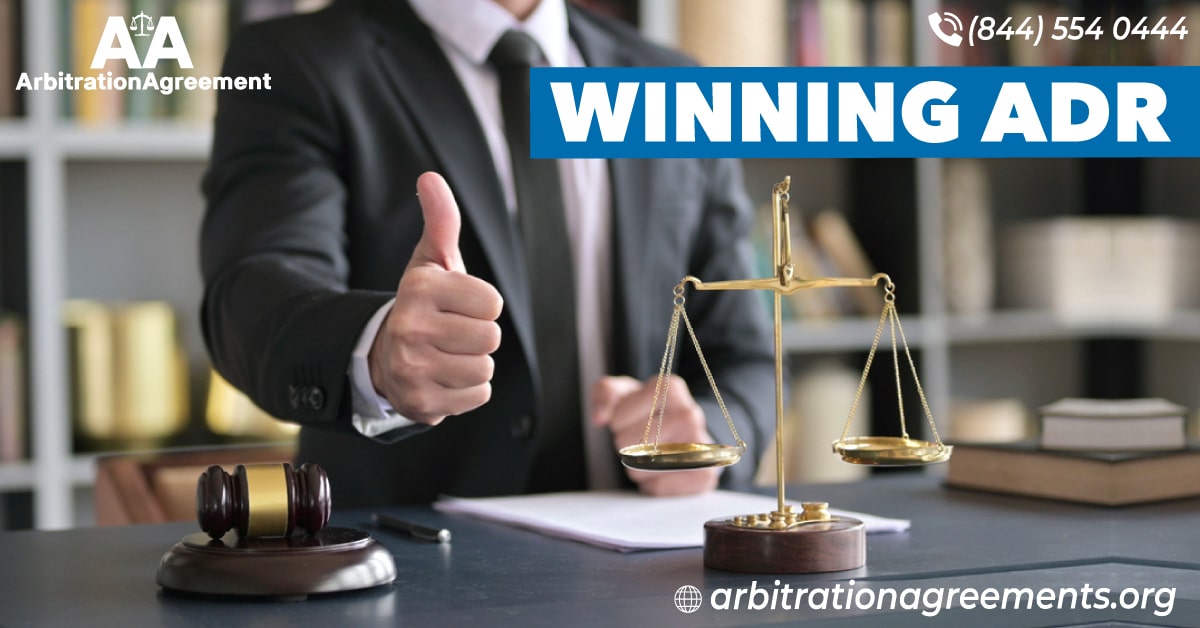Winning ADR Alternative Dispute Resolution
Nitin Paul Harmon
Jan. 7, 2024, 11:04 a.m.
...
Nitin Paul Harmon
Jan. 7, 2024, 11:04 a.m.
...
When it comes to settling disagreements, there’s always the traditional courtroom drama we see in movies - gavels pounding, intense cross-examinations, and a cloud of tension filling the room. Mediation is defined? But what if I told you there’s another way? A way that's not just less combative but can also be, dare I say, fun? Welcome to the world of Alternative Dispute Resolution (ADR). If you're looking to not just participate, but also win at ADR, you're in the right place. Buckle up, buttercup! Let’s dive in.
Picture this: fewer legal bills, a faster resolution, and maintaining a good relationship with the other party. Read here about the Mandatory Arbitration Clause. ADR is less formal than traditional court proceedings, offering a flexible and often more amicable approach toConflict Resolution. It’s like choosing to have a chat over coffee rather than a showdown at the O.K. Corral.
You might think it's all about having the best arguments or the most evidence. Sure, those are important, but the real secret lies in your approach. Do you want to know What is the Difference Between Arbitration and Mediation? ADR isn’t a battleground; it’s a conversation. Keeping that in mind can make all the difference.
Practice Active Listening: This isn't just about waiting for your turn to speak. Really listen to the other party. You might find common ground you never knew existed. Do you want to learn more about Arbitration vs Mediation vs Litigation?

Absolutely! Think of ADR as a dance. Read more aboutThe Arbitration Agreement Association. If both parties are in sync, it's harmonious. If one person is doing the cha-cha while the other is attempting the moonwalk, it’s going to be a mess.
Here’s a fun fact: in ADR, it’s not always about "winning" in the traditional sense. Want to know what is about Arbitration Means in Law? It's about finding the best possible solution for everyone involved. Sometimes, that might mean not getting everything you initially wanted. And that’s okay! The aim is a resolution that both parties can live with, not walking away with a trophy.
Absolutely! Just because we've covered some ground doesn't mean the journey's over. Here are a few more nuggets of wisdom for your ADR adventure.
You betcha! We communicate so much without saying a word. Just think about the last time someone rolled their eyes at you or gave you a thumbs-up. Do you want to knowThe Advantages of Arbitration over Litigation? A whole conversation without a single word, right?
Navigating the intricate maze of conflict resolution might feel overwhelming. Luckily, you're not the first to seek answers! Federal and State Courts. Here's a collection of the most frequently asked questions about ADR. Get ready to become the life of the party with your newfound knowledge!
ADR, or Alternative Dispute Resolution, is an umbrella term for various methods used to resolve disputes without resorting to traditional courtroom litigation. Think of it as a more relaxed, less adversarial approach to finding a middle ground. It includes processes like mediation, Arbitration, and conciliation.
While court proceedings are formal, often lengthy, and based on strict legal principles, ADR is typically more informal, quicker, and flexible. ADR focuses on mutual agreement and understanding rather than a win-lose outcome. Do you want to know Who Pays For Mediation? Plus, you can often avoid those intimidating courtrooms and opt for a more comfortable setting.
It depends on the type of ADR. For instance, arbitration decisions (known as "awards") can be legally binding and enforceable in court. In contrast, mediation is generally non-binding unless both parties agree to a settlement, which can then become a binding contract.
From commercial to family disputes, and from employment issues to consumer complaints, ADR can handle a wide range of conflicts. Federal-Arbitration-Act Impact a Binding Arbitration Agreement. However, it might not be suitable for all situations. For example, criminal cases or certain public interest issues may be better suited for traditional courts.
There are many potential perks! ADR can be less expensive, faster, and more private than court litigation. Do you want to knowWhat is Forced Arbitration? Additionally, it allows the involved parties to have more control over the process and outcome. And hey, preserving relationships and reducing stress are added bonuses!
Absolutely! While ADR is less formal, you still have the right to legal representation. Having a lawyer can help ensure you understand the process and your rights. They can offer guidance, but remember, the final decision in ADR processes like mediation lies with the parties involved.
Seek someone who is impartial, experienced in the ADR process, and has knowledge in the specific area of your dispute. Know about the Arbitration Process. Good communication skills and empathy are also crucial. It's like picking a dance partner; you want someone who can guide you without stepping on your toes! Our association can provide a full roster of esteemed mediators and arbitrators.
8. If ADR Doesn't Work Out, Can I Still Go to Court?
Yes, you can. If ADR doesn't lead to a resolution, traditional litigation remains an option. However, any admissions or offers made during ADR are typically considered Know about Arbitration vs Litigation. Confidential and can't be used as evidence in court.
Whether you’re a newbie to the world of Alternative Dispute Resolution or an old hand, the journey to resolution can be smoother, quicker, and, yes, even fun, if approached with the right mindset and tools. Want to know The Arbitration Clause and provision? Remember, it’s not about battles and battlegrounds, but conversations and common ground. So, next time conflict comes knocking, why not invite it in for a coffee and a chat? You might just find you both leave as winners!